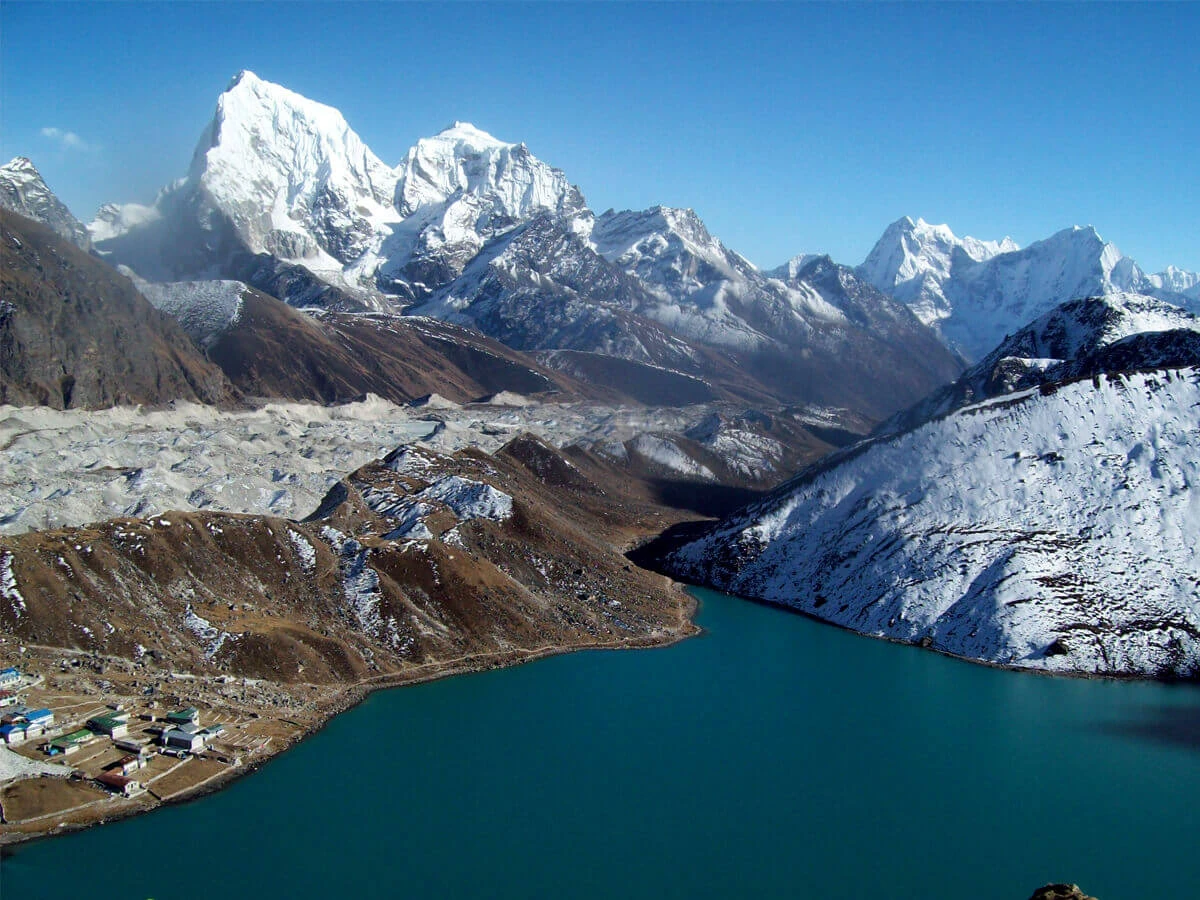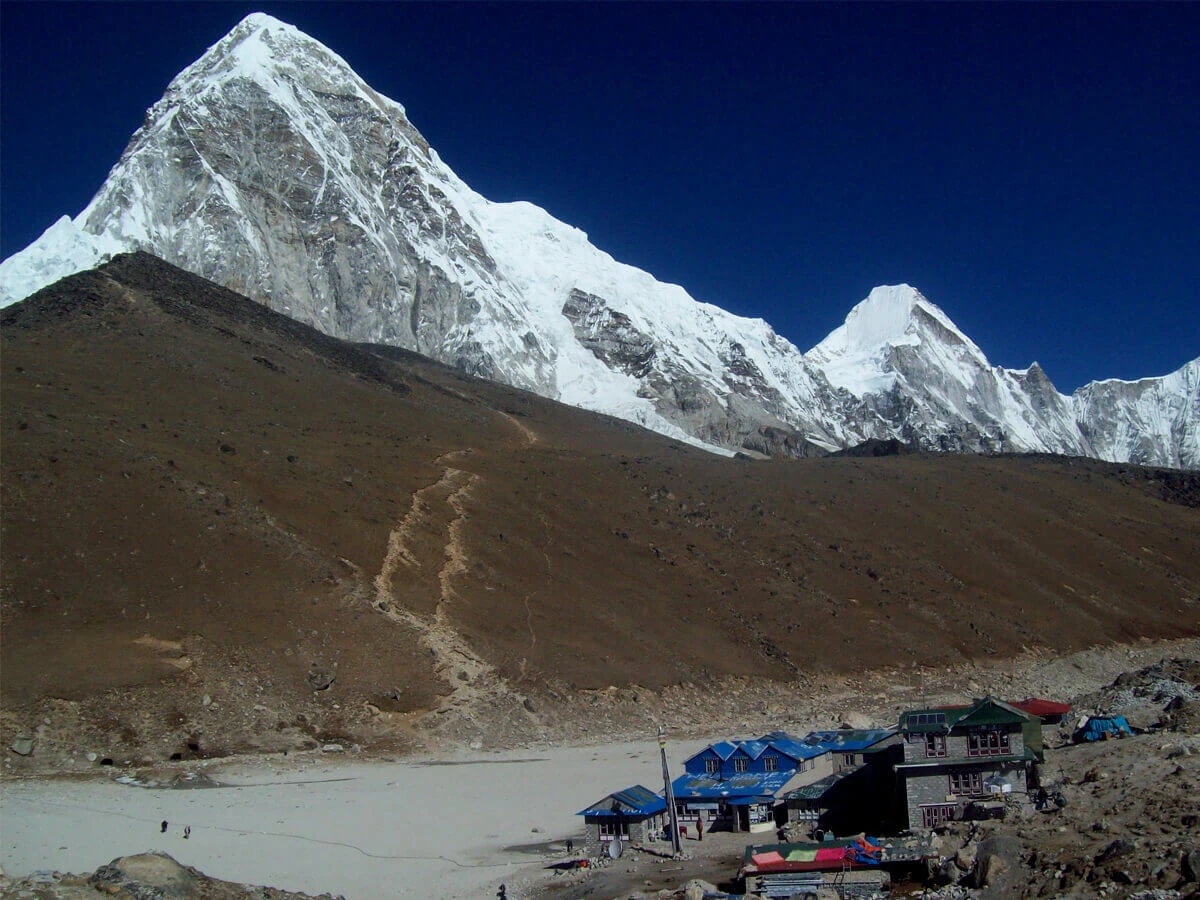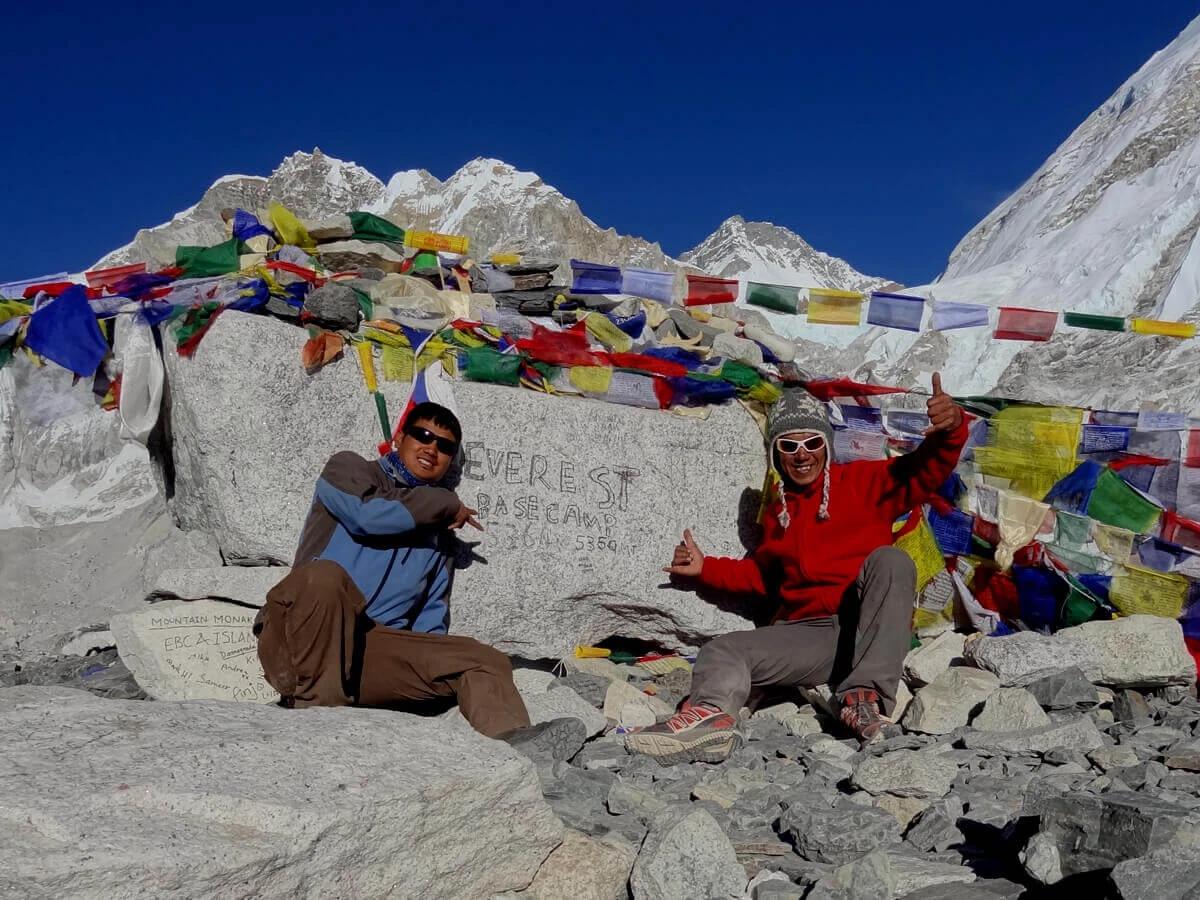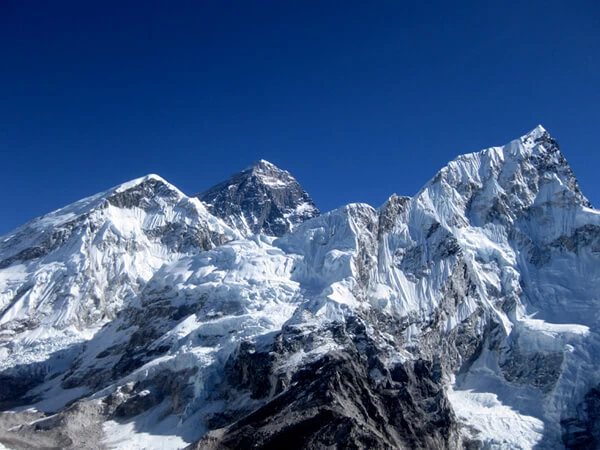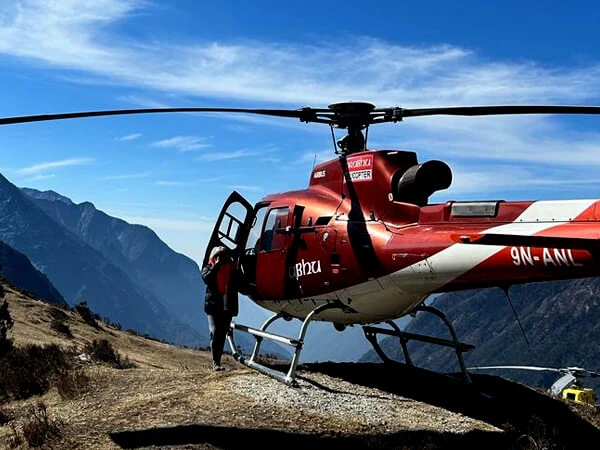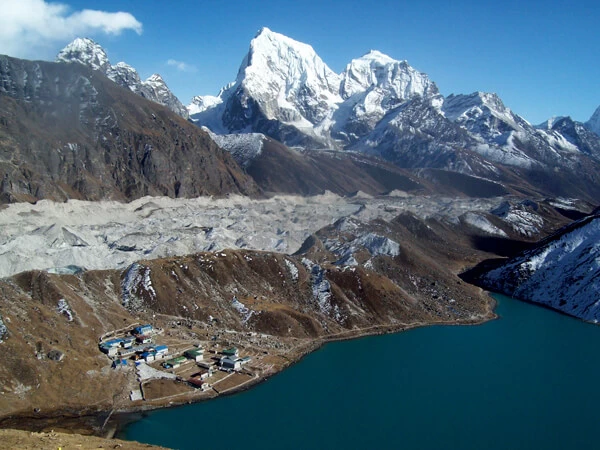The Everest Three Passes Trek 2026 is the most complete and thrilling adventure in the Everest region. A life-changing, unforgettable trek designed for true adventurers who dream of exploring beyond Everest Base Camp. This route takes you through Sherpa villages, monasteries, Everest Base Camp, and three high passes: Kongma la (5,535m), Cho la (5,420m), and Renjo la (5,360m), making it the ultimate Khumbu region trek. Along the trek, you’ll witness massive glaciers, icy lakes, and countless peaks, including Everest, Lhotse, Makalu, Cho Oyu, and Ama Dablam. Each pass opens up a new world of breathtaking views and unforgettable experiences. It’s a challenging route that demands good fitness, mental strength, and a love of adventure. But with every challenge comes a reward. The Everest Base Camp and Three Passes trek is more than just a trail; it’s a test of endurance, a cultural exploration, and a journey into the soul of the Himalayas. In this itinerary, we include a professional guide, porter, and all the necessary permits, with the cost designed to give a once-in-a-lifetime Himalayan experience.
Everest Three Passes Trek - 20 Days
Trip Facts
Everest Base Camp Trek is a world-famous trek route. The value Everest Base Camp holds and the value it provides to trekkers are beyond words or expression. It can just be held in the heart and soul through the experience. To help trekkers have a heart-pleasing experience, alternative trails are available as per the trekker's wishes: Everest Base Camp Trek from Lukla, Everest Base Camp via Tsho La Pass, Everest Base Camp trek via Renjo-La, and Tsho-La, or the most one Everest 3 passes Trek.
Everest Base Camp trek via three passes (Everest 3 passes Adventure Trek): Renjo-La, Cho-La, and Kongma-La is a full, compact package of adventure and thrill. They require more days to spend in high altitudes, more trails to walk on, and more effort to accomplish. However, the view and experience gained overcame all the hard work and effort put into the Everest 3 passes Adventure Trek. Travelers encounter variations in a scene from wild fauna, villages, glaciers, lakes, and high passes to mountains in this single trek. The trails may lead to exclusive musk deer, red panda, Thar (mountain goat), and snow leopard, with the steep climb and descent to Ngozumba glacier, Gokyo lakes, and the village. Likewise, the 3 Everest Passes are Renjo La (La means Pass in the Tibetan language) (5,465m), Cho La (5,420m), and Kongma La (5,535m).
Everest 3 Pass Adventure Trek begins as travelers land at Lukla Airport and move forward to spend an additional day in Namche Bazaar for acclimatization. From Namche Bazaar, trekkers head towards Chhukung to pass Kongma-La. Usually, trekkers head directly towards Lobuche, as in the Everest Base Camp trek or the Salleri to Everest Base Camp trek. After passing Kongma-La, Everest Base Camp and Kalapathar are attained. Then, the highest pass Tsho-la (Cho-la) is required to be completed to reach Gokyo village and explore Gokyo Lakes and Gokyo Ri. Further, Renjo-La is the final pass that needs to be attained and walked down to Lukla via Namche Bazaar for the completion of the Everest 3 Pass Adventure Trek, formed by the Nepal Adventure Team.
Nepal Adventure Team focuses on adventure to be conquered by adventurous people and forms exclusive trekking and traveling packages for enthusiastic travelers. The packages of the Nepal Adventure team amuse the heart and soul of most travelers
Highlights
- The base camp of Mount Everest, the highest peak in the world
- 3 Everest passes: Renjo La (La means Pass in the Tibetan language) (5,360m), Tsho-La (Cho La 5,367m), and Kongma La (the highest pass in the Khumbu region, 5,535m).
- Kala-Patthar (5545m), the highest point of the Everest Base Camp (EBC) trek
- Explore shimmering and unmodified lakes
- Ngozumba, the Longest Glacier in Nepal
- Gokyo Ri viewpoint, view of the Himalayas, glaciers, and lakes
- View of the Himalayas: Mt. Everest (8,848m), Lhotse (8,516 m), Cho-Oyu (8201m), Nuptse (7,855m), Amadablam (6,812 m), and Mt. Makalu (8,463 m) with other unnamed peaks
- Gokyo Valley was designated as a Ramsar Site (wetlands of international importance) by UNESCO
- Sagarmatha National Park, UNESCO World Heritage Site
- Sacred Himalayan Landscape and World Wildlife Fund
- Lukla Airport, a famous airport with a short runway
- Namche Bazar, a world-renowned village at a high altitude
- Tengboche Monastery, the largest monastery in the Khumbu region (Dudh Koshi George)
Outline Itinerary
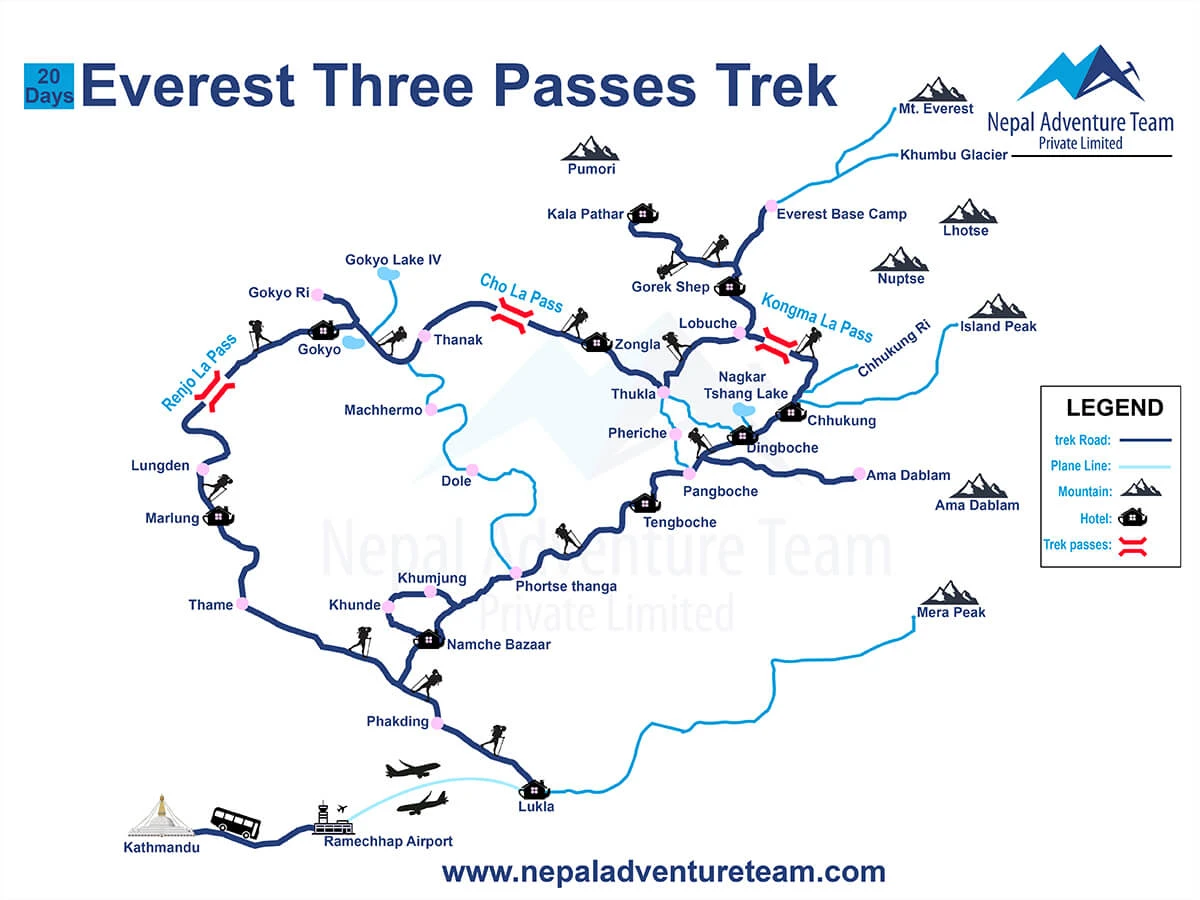
Everest Three Passes Trek - 20 Days Itinerary
Arrival at airport and transfer to hotel
Nepal Adventure Team staff will receive you at Tribhuvan International Airport and settle you to respective hotels in Thamel area. Welcome dinner with cultural program is organized by Nepal Adventure Team to fire up the energy for the trek.
Preparation day in Kathmandu
This day is all about the preparation required for the adventurous trek in Everest region. You will be informed about the trekking plans, tips, tricks and required materials for cozy journey. You can just res and relax for entire day to accumulate the energy for trek or just explore the Kathmandu valley and the World Heritage Sites.
Fly to Lukla 2,820 m and trek to Phakding 2,640 m - 04 hrs
With crispy breakfast, we fly to Lukla from Kathmandu for around 30 minutes which lights up every minute by the surprising view of landscape. With short break, the hike initiates to Phakding. This day will be a warm up day for the trekkers and wonderful night nearby mountain region.
Trek to Namche Bazaar 3,440 m - 05 hrs
Dudh Koshi accompany us in our hike as me move forward to Namche Bazar. On this day, we enter into Sagarmatha National Park area through the entrance at Monjo. Sagarmatha National park is also an UNESCO’s World Heritage Site and listed as highest park. The high bridge and uphill haul direct to Namche Bazaar, a wonderful town filled with colourful houses serving as hotels and lodge set in a U shape. Namche Bazaar is the last place with modern facilities of ATM, Banks, post office, Cyber Café, Trekking / Climbing stores, bakeries and restaurants with great views of Kwangde peaks towards south.
Rest day at Namche Bazaar for acclimatization and excursion
A day is separated for acclimatization at Namche Bazar. You can go for the hike to the nearby areas as National Park Headquarter, Museum, market, and monastery and like. You can observe the lifestyle of local people. Besides, you can just rest and relax by cherishing the view of mesmerizing mountains; Everest, Thamserku, Kangtenga, Kwangde, Ama Dablam, Khumbila, and more.
Trek to Thyangboche 3,867 m - 05hrs
After a peaceful day at Namche, early morning we head into a winding trail of rhododendron and pine trees with the fabulous views of Amadablam, one of the most beautiful peak. Trail to Thyangboche offers great views of Mt. Everest, Nuptse, Lhotse, Thamasarku and Kwangde peak. The path descends to Imjatse River reaching at Phunge Tenga, a tiny lunch stop. Follwing Pristine forest ends us to Thyangboche Monastery, spot with amazing views of Amadablam, Kangtenga, Thamasarku, Kwangde with Mt. Everest. Thyangboche monastery is regarded as a holy place as the head lama (Rinpoche) of the monastery resides in this monastery. Usually, trekkers and mountaineers visit to get blessed from the priest for safe trek and expeditions.
Trek to Dingboche 4,260 m - 05hrs
Downhill walk through fresh rhododendron and pines forest and bridge over Imja Khola assist to reach at Pangboche village, stone houses, this is the last permanent village before Everest Base Camp. Leaving the tree lines, rhododendron and juniper bushes, open area with super views of Mt. Amadablam at close distance is explored. Dingboche is our home for the night.
Rest day at Dingboche for acclimatization and excursion
Nepal Adventure Team plans another rest day at Dingboche for safe, adoptable and enjoyable trekking. Altitude gains rapidly from Dingboche and a rest day helps to acclimatize well to reach Everest Base Camp in sound way. Dingboche offers stunning views North Face of Amadablam, Imjatse Peak, Nuptse and Lhotse mountains, a short high climb on the ridge provides views of world’s 5th highest Mt. Makalu and Amphu Labtsa peak in fabulous way.
Trek to Chhukung (4750 m) - 04 hours
Heading eastward to the last settlement of Khumbu and at Imjatse valley rim with mindboggling sceneries of surrounding high snow capped mountains, we settle at Chhukung. We reach Chhukung on aftertoon such that one can rest or hike to Chhukung Ri for more super views of the mountains as well as prepare for next early adventure towards Kongma-la pass.
Trek to Kongmo - la (5535 m) and to Lobuche (4928 m) - 08 hours
After wonderful break in Chhukung, dawn walk through uphill icy and rocky path for an hour beneath Kongma-la take to its peak Kongma or Mehra. After a good rest, traverse the Kongma-la pass at 5,535 m / 18,159 ft enclosed between the great Nuptse, Mehara and Pokalde peaks. One has to be careful on vigorous climb while heading towards Khumbu glacier and moraine which is quite the misleading and confusing. Descends and steep climb up to the terminal debris of Khumbu Glacier drop us at Lobuche for overnight stop.
Trek to Gorakhshep (5160 m) and visit to Everest base camp (5320 m) 5 hours and stay at Gorakhshep
Starting the morning with a gentle walk could be hard due to high altitude yet gains the views of Mt. Pumori, Lingtrin, Khumbutse and Everest. After 2 hours of strenuous walk on moraine and icy trails we make to Gorakshep. Gorakshep has 4-5 nice lodges being the last place with lodge facilities before Everest Base Camp. Break at Gorakshep enables trekkers to further continue the journey to Everest Base Camp through the trails of moraine overlooking at Khumbu Icefall. An hour of exploring and refilling the experience of Everest Base Camp, we return to Gorakshep for the stay.
Hike to Kalapathar 5,545 m/18 and walk to Dzongla, 4,830m - 06 hours
On the 11th day, we reach our next highlighted destination and the highest point of 2 pass Everest Base Camp Trek. With a steep climb for 2 hours we land to Kalapatthar hill top, a black rocky ridge at 5,545 meters high, offering awesome panorama of giant peaks and Mt. Everest at arm’s length distance towards East. After an incredible experience, with high spirit return to Gorakshep and continue trek downhill to reach at the base of Cho-la pass in Dzongla. Dzongla is a temporary settlement with few Teahouses / Lodge with grand views of Cholatse and Taboche peaks.
Dzongla to Cho-la pass 5,367m/17604ft, walk down to Thanknak 4,750m - 07 hours
Today we cross the high Tsho-la (Cho-la). The path is steep up and requires crossing the glacier on the eastern side. The top of the pass has an altitude of 5,367m and sometimes it will be quite challenging to traverse due to snow. From its top, it offers awesome views of giant mountains and Cholatse Glacier. We descend carefully to Thanknak for stay at 4,750m. Thanknak is a small isolated spot with few Teahouses / Lodge which is just 2-3 hours away from Gokyo Lake
Trek to Gokyo 4,750 m/15, 580ft, climb to Gokyo Ri 5357 m 17570ft - 04 hrs
After great time passing Cho-la, an easy walk following the main Gokyo trail through Na, a small hamlet at the foot of the Ngozumba glacier leads to Gokyo Lake. Following a scenic trail, climbing a rocky path into ablation valley we pass the first lake (Longpongo), the second lake (Taboche Tsho) and the third lake (Dudh Pokhari). The bank of the shore is summer settlement of Gokyo at 4,790 meters. After lunch, free for hike to Gokyo Ri at 5,357m another highlight of this adventure. Gokyo Ri offers breathtaking scenery of world’s highest peak from Mt. Cho Oyo, Gyachung Kang, Mt. Everest, Mt. Lhotse, Cholatse, Taweche and to the east Mt. Makalu as well as Gokyo lakes and valley. We stay at marvelous and sound Gokyo village.
At Gokyo rest to visit fifth lake - 05 hrs round trip
An optional excursion to Gokyo 5th Lake, a 5 hours of round trip, requires packed lunch as the walk leads towards North in complete wilderness through glaciers and moraine rocky path. We head towards the base of Cho-Oyu world 6th highest mountain straddles as the border of Nepal-Tibet. On reaching the 5th lake enjoy the grand views of Mt. Everest, Changtse and towering ice wall of Cho-Oyu. Return to Gokyo with afternoon free time and prepare for further traverse and crossing of Renjo-la.
Gokyo to Renjo-la 5360m/17585ft and descend to Marlung, 4,210m - 07 hrs
On 15th day, we march to accomplish Renjo-La one of the essential destination of 2pass Everest Base Camp trek. At dawn, we leave Gokyo and catch the route to the pass which offers sight of Mt. Everest, Lhotse, Cholatse and Taboche. On reaching Renjo La pass at 5,465 m / 17,929 ft, one of the most difficult sections of this adventure, our effort shines with the Mt. Cho-Oyu and other high surrounding peaks. After a pleasant break, walk follows to frozen ponds beneath Renjo La pass, and then a long descend settle at Lungdeng which is near to Nangpa-la pass towards Tibet. Walk continues to reach Marlung village for night stop above Bhote Koshi River
Marlung to Namche 3,440m -06 hrs
Marlung to Namche seems to be easier trek after long hard walk of previous days and achieving our goal to cross all three great high passes of Khumbu. From Marlung our route encompasses Thyangmoche and Hungmo village. Several scattered Sheppard’s huts and Yak grazing pasture are encountered at Thame area. After reaching outskirt of Thame village, short uphill walk from Mende to Thamo includes hydro power of Namche and other Khumbu villages. Further, green woodland of tall pines and rhododendron tree lines are visible as the path approach to Namche Bazaar.
Trek to Lukla 2,800m - 07 hrs
A pleasant and relaxing walk exploring the surrounding leads back to Lukla. It is the last day to walk in 2 passes Everest Base Camp trek. Just few small uphill climb brings back to Lukla for last overnight stop around Khumbu and Everest region. As we reach Lukla, we give farewell to our loyal and friendly porters.
Fly back to Kathmandu and transfer to respective hotels
Flight starts early morning so we transfer to Tenzing and Hillary air terminal at Lukla airport. On boarding the plane a sweeping flight of 30 minutes lands you in Kathmandu. You are transfer to respective hotels with leisure. Farewell dinner will be served in the night time with music and dance.
International departure
As per international flight time Nepal Adventure Team staff will transfer you to international airport for your flight. With excellent service of Nepal Adventure Team, we ensure great adventure of 2 passes Everest base camp trek. Looking forward to serve you in trekking and traveling, we bid you warm goodbyes.
Everest Three Passes Trek - 20 Days Cost Details
Includes
- Airport pickup and drop-off by car
- Welcome and farewell dinner at a typical Nepali restaurant
- Kathmandu- Lukla -Kathmandu flight
- 3 nights' hotel in Kathmandu on a BB plan basis
- 17nights teahouse lodge during the trek
- 18 days full meal board, Breakfast, Lunch, Dinner, and tea/coffee in a cup
- Fluent English speaker, licensed, qualified trekking guide (leader), and assistant guide as per the group
- Porter service, 1 for 2 trekkers
- All staff (guide and Porter) salary, food, equipment, lodge and insurance, flights, and the like.
- Sagarmatha National Park fee (permit)
- TIMS Card (Trekkers Information Management System)
- Sleeping bag and down jacket (if needed)
- Trekking route maps
- First Aid Medical Kitbag
- All the government and local taxes
- Nepal Adventure Team’s T-shirt and certificate of appreciation
Excludes
- Nepal visa fee
- International flight ( airfare)
- Extra drinks, both alcoholic and non-alcoholic
- Personal expenses as phone bill, chocolate, bakery & cake, battery charge, laundry, hot shower, and extra porter
- Extra accommodation and meals beyond the schedule
- Tips to guide and porters
Dates & Availability
The following dates are the fixed departure dates and a common schedule. If you want a special and private package we can arrange one for you.
Essential Information
The group’s safety is very important to us. Please note that your leader has the authority to amend or cancel any part of the itinerary if it is deemed necessary due to safety concerns. Even though every effort is made to go as planned, a little change might occur in the itinerary because of weather conditions, the health condition of a person, unexpected natural disasters, etc. The leader will try to ensure the trip runs as planned, but please be prepared to be flexible just in case.
In the event of flight cancellation/delay in/out of Lukla: Due to bad weather conditions(which might even happen in the best season), it is very likely that the flight to/from Lukla could be delayed or canceled so make sure you have a day or two extra in your plan. Meanwhile, we could either get back to the hotel after booking another flight or hire a helicopter for extra expenses. This is when your travel insurance comes in handy to claim back the expense. Please note that there will be no refund. If the cancellation happens before the trip, you will be given proper lunch and accommodation, but if it happens after, you have to cover the additional expenses yourself.
Passport & Visa
All foreign nationals, except Indian citizens, need visas to enter Nepal. Getting a visa must be the easiest one though. You just have to go to the Nepalese Embassy/consulate in your country or it can also be obtained upon your arrival at Kathmandu International Airport. To get a visa, you need to bring 2 pp size photos, visa fees, and a valid passport.
Tourist Visa Fees: 3 days transit visa - Free of Cost
- 15 Days – 30 USD
- 30 Days – 50 USD
- 90 Days – 125 USD
For more information, please contact the Department of Immigration.
Kalikasthan, Kathmandu
Tel: 00977-1- 4429660 | 4438862 | 4438868 | 4433934
E-mail: mail@immi.gov.np.
Website: http://www.nepalimmigration.gov.np/
Means of Transport
Domestic flight to Lukla and back to Kathmandu, or private vehicle and walking. All the cost is already included unless otherwise noted.
Travel Insurance
Travel insurance is a must when you travel abroad. Therefore, before you come to Nepal, please make sure you have your insurance documents with you, since our insurance companies cannot insure foreign nationals. Because of the reason that they cover all the expenses if you face some unfortunate happenings, and you have to be rescued or medically assisted during the trip, or if your belongings are lost or stolen.
Solo Travellers
We have arranged for a single traveler to pay for a single trip only. He has to share the accommodation with other people of the same gender, though, while he can also join the other groups.
Foods and Accommodations
All meals are provided during the trek, while only breakfast will be available in Kathmandu. Generally, traditional Nepalese(daal, Bhat, curry, and pickle), Tibetan, Continental, Indian, and other cuisines are available in the local lodges/teahouses. There will also be a welcome and farewell dinner for guests in Kathmandu. In Kathmandu, you'll be staying in the best quality standard hotel, on a twin-sharing basis. On trekking, accommodations are simple yet comfortable in on-mountain lodges. Toilets and bathrooms need to be shared in some teahouses.
Note: A single room is always available, but only on special requests and at spending extra cost.
Health and fitness are required.
No previous experience is required since it's a moderate trek. But being a healthy person physically and mentally is very important. It is better if we prepare ourselves a few days/weeks before the start of the trek by jogging and running regularly since will be walking a lot of ups and downs in the hills, ridges, villages, and mountains. Participants with pre-existing medical conditions should inform us beforehand.
First Aid Kit/High Altitude Sickness
Nepal Adventure Team strongly suggests that you have your first aid or medical kit. This trip takes you to some high altitudes though not much but the slow walks and regular stops between the walks will help you acclimatize to high altitude saving you from the high altitude sickness called AMS(acute mountain sickness). Gaining altitude without proper consideration of AMS is fatal.
Your Guide and Porter
Since mountain trekking takes you to remote places over high altitudes, the leader should have a piece of significant knowledge in the field so that he can wonderfully and safely lead you there safely and clear any obstacles on the way. We, the Nepal Adventure Team, can proudly say that our guides are highly qualified for the role. They are fully trained, experienced, and licensed. They have undergone a whole lot of training to make themselves useful in various situations and to make your journey a smooth and pleasant one.
Our porters are always fully equipped with the gears they need and as per the company policy, they are always insured and completely looked after. They are our backbone. We allow a maximum weight of 25kg to be carried by one porter. We make sure that they are well-paid and well-treated.
Best Time to Travel
The best time for trekking the Everest three passes trek is Spring (March to May) and Autumn (September to November) because the weather is warm and moderate, while the view and visibility are the best. Winter is also somehow fine, but the monsoon is the less frequented time because of the occasional heavy rain, and when the roads might be troublesome.
Equipment and Packing Lists
After booking with the Nepal Adventure Team, please pack the necessary items as listed:
1. Travel documents: passport, visa (if you have one), travel insurance, air tickets, voucher, passport photo (x 2)
2. Bank cards, credit cards, travelers' cheques, etc
3. Comfortable boots and runners/sports shoes.
4. 6-8 pairs of socks, woolen/cotton.
5. Fleece jacket, Down / Duvet Jacket, and Rain / windproof jacket.
6. Gloves- 2 pairs.
7. T-shirts 4-6 pcs, shirts(woolen/cotton).
8. A cap for the day and a woolen hat or balaclava for evening/morning wear.
9. Trousers.
10. Shorts and tracksuits.
11. Sleeping bag (4 seasons) with inner liner.
1. Large and small towels.
2. Toiletries.
3. Water bottle.
4. Sun /snow glass.
5. Ski / walking poles(optional but useful).
6. First Aid/medical kit.
7. Rucksack/backpack.
8. Duffel Bags (carried by porters or animals).
9. Torch / Flashlights with spare batteries.
10. Pen knife/ Swiss knife.
11. Scarf/mask (for dust and wind).
12. Personal hygiene stuff.
13. Any other extras you feel are necessary, like binoculars, cameras, books, journals, and more.
Precautionary Note:
Trekking has been long established in Nepal, so the itineraries are modified and moderated in such a way that you can take it easy and slow. DO NOT RUSH AND ENJOY. There is plenty of time, and the guide will keep track of you all the time. It might be a bit harder or a bit colder, but you will get used to it.
Additional Money
Every traveler is different and they spend their own way. Some spend on food and drinks while others on souvenirs. Either way, consider your own spending habits and also tipping, emergency fund ($200), etc before you pack up and leave.
Trip Specific Safety
Your guidance is always there for your safety concerns and to look after your valuables. But you have to be equally careful. Carry some sort of wallet or belt for your important documents and money. Hotels have a safety deposit box where the lock is recommended before passing the luggage.
A Couple of Rules
Possession or use of any illegal drugs is intolerable. It is because of the law that respects the local people and their culture. The group will be expelled in such a case.
Responsible Tourism
Nepal Adventure Team strongly believes that we are all equally responsible for acting in favor of the local people and the surrounding environment. Our clients, too, have an important role in
A. Respecting local laws, customs, and beliefs
B. Always ask for permission before doing something locally, or consult the leader
C. Keep the area the same as you found it, wherever you go, and dispose of rubbish
D. Support local skills to encourage the positive sides of tourism.
Feedback and Reviews
This is very, very important to us. After your trip, we want your feedback on whether it is good or bad since that's the way we can thrive further. To motivate you to finish the review or feedback online, we are going to give you an 8% discount on your next trip with us. Outstanding, ain't it?
Additional Information
For all additional information, go to Contact Us:
Directly call us (Jeevan Thapa Magat) at +977 9851234322 Viber/WhatsApp (24/7 Hours Service)
What Our Guests Say?
The sense of accomplishment upon reaching each pass, including Renjo La, Cho La, and Kongma La, was unparalleled. Standing at the top of Kala Patthar, with Everest towering majestically in...
Crossing Kongma La, Cho La, and Renjo La passes challenged both my physical and mental strength, but the sense of accomplishment upon reaching each summit was indescribable. The hospitality of...
I have no words to express my happiness. Nepal adventure team is the one of the best in Nepal for trekking. Thank you Jeevan for everything.
